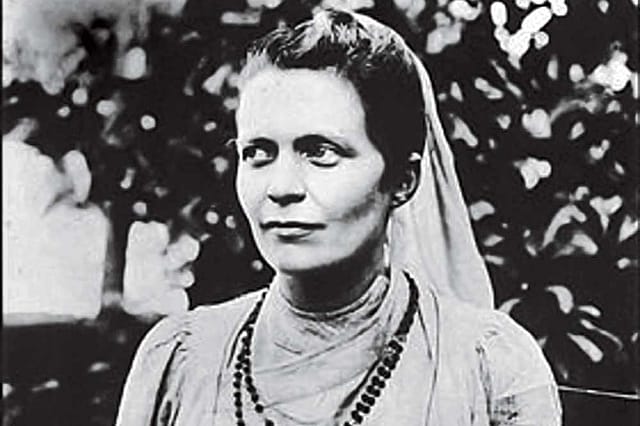The First Bharat Mata

IN TIME FOR the 150th anniversary of her birth arrives this excellent and frustrating biography of Margaret Noble, better known as Sister Nivedita of Vivekananda. Nivedita (or 'dedicated') was one of the 'Hindu revivalist' thinker and Vedanta proselytiser's closest disciples.
In a recent speech, Prime Minister Narendra Modi highlighted the Swami's focus on 'youth'. Vivekananda's chief social aim was to bring into being a vigorous, 'manly' Indian youth with a genuinely Indian sense of nationhood and oneness. The context was British colonial rule and the deliberate and insidious discrediting of 'Hinduism' as degenerate (or effeminate, or childish) and impervious to rational modernity, and of India as possessing any kind of nationhood at all.
It is the Irish-born Nivedita who took the question of an organic Indian nationhood especially to heart and, after Vivekananda's death, made it her mission. Her goal, going beyond that of her master, was cultural more than spiritual, and later it was even political: hence her strenuous, even pushy engagement with education, art and science in India, as well as politics. Operating out of Calcutta, where she intermittently ran a school for girls, she was near the nerve centre of these networks.
She did help to shape the discourse. The marks of her influence survive. For instance, she was the model for the first 'Bharat Mata', a painting by Abanindranath Tagore, a nephew of Rabindranath.
Imran Khan: Pakistan’s Prisoner
27 Feb 2026 - Vol 04 | Issue 60
The descent and despair of Imran Khan
It's important to flag the Tagores because Nivedita's biographer Reba Som is a Tagore scholar, Rabindra Sangeet singer, and former director of the Rabindranath Tagore Centre in Kolkata. The most insightful judgements of Nivedita quoted in this book come from the poet himself—other than, of course, those by her master!
The book is built on letters, including the 800-plus surviving letters written by Nivedita to Vivekananda, to his overseas associates, to her family, to the handful of men who influenced her and to Indian intellectuals and political figures.
Nivedita, or Margot as she was called, had a talent for polemical writing, and the intellectual capacity to interact with great minds. Vivekananda saw that she would be the perfect bridge-maker, as an unquestionably Hindu European woman, embodying his universalist ideas to the orthodox opposition as well as the urban and European elite of India and the West.
Som sorts the life and letters into three periods, denoted by Nivedita's changing relationship with Vivekananda. At first she was the young woman captured by the vision and the personality (even the person) of Vivekananda, whom she called her 'King'. Deliberately he shifted into the role of 'Father', and later to 'Master'. These changes required great discipline in Nivedita, and she never faltered in her dedication.
Between his death in 1902 and her own in 1911 she worked hard, to strengthen the Vedanta mission, maintain links and raise funds in the West. Through the letters, Som tracks Nivedita's hectic travels as well as her close relationships. The letters also offer perspectives on her anticolonial politics, including the constant police surveillance and how she handled it.
Som reads all this change and activity, but curiously keeps her vivid and disputatious subject at arm's length. Not even in the final chapter with its numerous appraisals (a long one from Tagore) does the author say what, if anything, she feels about Nivedita. There is no overt, fresh, or comprehensive estimation of the person and her life work and legacy.
There is, however, a clue on the cover: Margot is the title, and 'Nivedita' in the subtitle. One, the independent thinker; the other, an obedient disciple. If Nivedita's life was charged with the tension between these two poles, is the title Som's way of telling us that, in the end, Margot comes to re-dominate?
Sadly the book never comes to full, feelable life. It is an academic biography, certainly a success, but assuredly not the last word.
